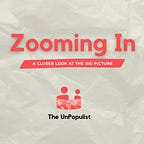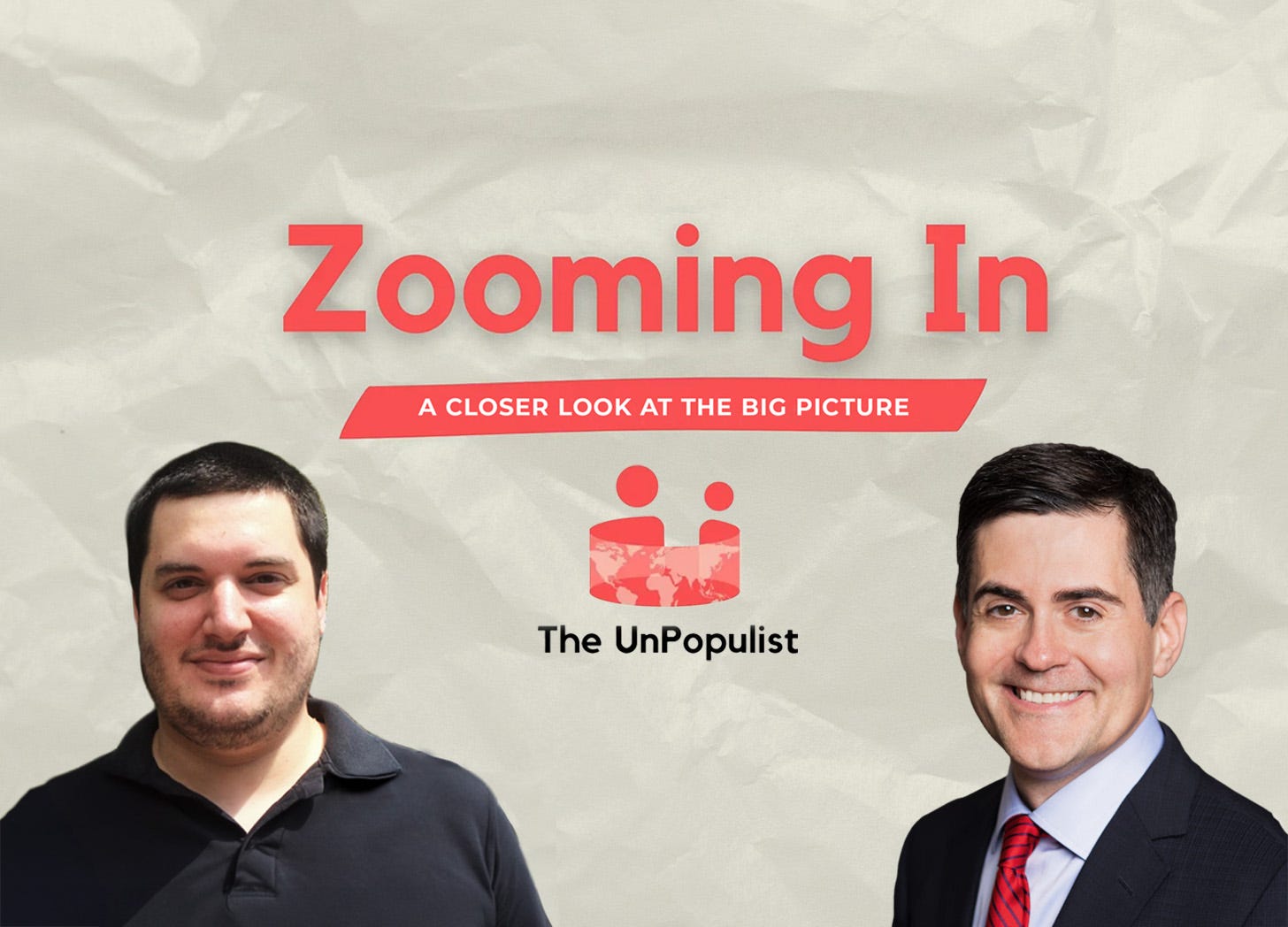Listen to Zooming In at The UnPopulist in your favorite podcast app: Apple Podcasts | Spotify | Google Podcasts | RSS | YouTube
Landry Ayres: Welcome back to Zooming In at The UnPopulist. I’m Landry Ayres.
Does Christianity, or the Christian Bible, endorse a particular social configuration? What happens when faith communities tie their identity to political power? And can liberalism, with its emphasis on individual liberty and mutual respect, offer a path forward in a time of heightened polarization?
Today, Berny Belvedere, The UnPopulist’s senior editor, is joined by Russell Moore, who is editor-in-chief at Christianity Today, to discuss all of this and more.
Whether you’re a believer, a skeptic about matters of faith, or simply curious about the interplay between religion and politics, this episode raises questions that resonate far beyond any single election cycle.
We hope you enjoy.
A transcript of today’s podcast appears below. It has been edited for flow and clarity.
Berny Belvedere: Russell Moore, thanks for joining me today.
Russell Moore: Thanks for having me.
Belvedere: I wanted to dive right into the 2024 election. But in order to get there, I want to bring up some context and background from when Trump first became a serious political candidate. At that time, many evangelicals were skeptical of him. I know that sounds crazy today. But one of the shrewdest things he did in his early political arc was choose Mike Pence as his running mate. The Trump camp understood early on that he would need these intermediaries to help him gain purchase with communities that he didn’t have all that much in common with. Because, of course, as an infinitely vulgar, thrice-married, twice-divorced billionaire from New York, he badly needed brokers who could sell him to social conservatives in general and also to religious heartlanders in particular. So in came Pence.
Prior to that, evangelicals had not monolithically gone in for Trump. I remember one analysis during the 2016 primaries pointed out how more frequent churchgoers, those who would attend services multiple times a week, tended to gravitate toward Marco Rubio in many early contests. But as we all know, white evangelicals are now fully consolidated in the Trump camp. In the election we just had, Trump won eight out of 10 white evangelicals. And this is no small constituency—this is one-fifth of the electorate. Latino evangelicals, in particular, registered a double-digit shift toward Trump. Why do you think so much of the evangelical world has gone in so completely for Trump?
Moore: Well, I’m not sure whether Mike Pence was needed in order to be a broker in 2016. But I certainly think that the Trump campaign thought that that was the case—and that was a reasonable expectation.
It is true that there was this evolution that happened. Very, very few evangelical leaders supported Trump at the very beginning. As a matter of fact, you can think of Robert Jeffress, Jerry Falwell Jr., Paula White, if you want to include her as an evangelical—that was about it.
And you’re also right that at the beginning, there was quite a difference between frequent churchgoers and infrequent churchgoers. In the general election, there was one group of white evangelicals who were enthusiastically for Trump. There was another that weren’t enthusiastic but would use the lesser-of-two-evils transactional argument.
What I feared at the time and what I do think has happened is that that kind of transactional support on some things but not on other things doesn’t work in American life as tribalized as it is right now. And so I thought that what would happen is white evangelicalism would embrace Trumpism and Trump himself, including all of the personal things that you mentioned, and that’s exactly what happened.
Belvedere: I want to fast forward to the January 6 attack on the Capitol in 2021. At the time, you called on President Trump to step aside so that the country could heal. This was in response to Trump continuing to tweet and inflame the situation even more. You conveyed that the nation needed a rest from that. Many of his fellow Republicans, including prominent Republican leaders, actually said similar things at the time. And yet, you and they have since gone very different ways on the question of Trump’s fitness for office.
Fifty years into the future, looking back at our current political era, what level of blame do you think Republicans who ultimately declined to follow through on jettisoning Trump after January 6 will be ascribed in all this?
Moore: I think there’s a bigger factor here than the historical. I’m not sure exactly what that will look like, but I do know that at the level of moral character there is this tendency to think—and I’ve seen this not only in the House and Senate but also in churches and ministries and workplaces—“Well, if I conserve my influence and hold on to it for a little while by going along with things that I know are indefensible, then at the right time, I’ll be able to use my influence. I’ll be at the table.” I would hear that constantly from Republican members of Congress who believed just as I do about the unfitness of Trump for office, but who were saying, “I have to be at the table.”
“Christianity is thriving in China under an authoritarian, totalitarian regime. It can exist in those contexts. But in terms of what is the best framework for recognizing a Christian vision of human dignity and of what it means to treat people as spiritual beings, not just as a herd of political ideas … it requires a sense of freedom and pluralism.” — Russell Moore
And I’ve seen that happen in church situations with horrific kinds of scandals. It’s not just that I think the moral calculus there is wrong, although I do, but it doesn’t even work because there never does come a point at which one can say, “Well, my moral concerns now have no risk. So I can now bring them forward and utilize all the influence that I’ve saved up.” It just doesn’t morally work that way. I think what you saw after January 6th and since is an aspect of fallen human nature combined with a particular cultural moment that does not call forward much integrity.
Belvedere: One of the interesting aspects of that rationale—“I’m going to back a man who I have significant moral qualms with because that is the only way to play a role in the direction that American politics will go in the future”—is that it’s a kind of power-centric motivation. And an interesting dynamic that I’ve seen within evangelical discourse recently is that MAGA evangelicals believe that Trump-critical Christian leaders are ultimately guided by a craving for worldly power.
There’s some theological and historical and cultural background for this. So, for a long time in America, more ardently conservative Christians have opposed Christians of a less intensely conservative persuasion. When I say “of a less intensely conservative persuasion” that can include more moderately conservative Christians but it can also include centrist and even more liberal Christians. The point is this fight has been going on for a long time. So, a past iteration of this, as you know, pitted the group we call fundamentalists against those who were less scandalized by modernity. And I want to talk about today’s version of this kind of long-running intra-Christian drama.
So, MAGA evangelicals attribute the motivations of any prominent Christian to their left, on political matters at least, to something other than sincere belief. Some of these motivations can include a prominent Christian craving public respectability, desiring a place of influence within mainstream discourse, or having a cushy job as the kind of Christian who will echo or reflect the views mainstream liberals prefer a Christian to have (this is the idea of being “bought and paid for” by “liberal funders”), or any number of other motivations that emphasize careerist or material benefits. What does this get wrong about Christians who have taken a moral stance against Trump?
Moore: Well, I think I would disagree with the framing of the historical outworking of it because I actually think it’s in many ways flipped. So, the fundamentalist/modernist controversy is a little confusing for people who haven’t followed it historically because they think of “fundamentalist” in the way that the word seems to mean now or came to mean in terms of a particular kind of pugnacious mood, but that’s not what this series of essays, The Fundamentals, where the word came from, were about. They were actually about what C.S. Lewis would later call “Mere Christianity.” It was about fundamental belief in the authority of Scripture, in the miracles of Jesus, in the atoning work of Christ, the resurrection of Christ, the personal/visible Second Coming, all of those sorts of issues against those who were following a “social gospel” that said the theological emphases are less important than what Christianity does in the world, the latter group believing that we can Christianize the social order with a particular kind of ethic, and that’s what is really at the core of Christianity. So you had a kind of personal core of Christianity over and against a social-political core of Christianity.
I would argue that what we’re seeing in evangelicalism right now is indeed similar to the fundamentalist/modernist controversy, but in the other direction. A major fundamentalist leader, J. Gresham Machen, once wrote a really important and influential book called Christianity and Liberalism. He’s not talking about liberalism in a political sense, or even in a classical liberalism sort of political theory sense—he’s talking about fully identifying Christianity with the sensibilities and causes of the times and says that doing that makes it an entirely different religion. He uses the example: Christianity does in fact address communism, but when Christianity is a mere means to an end of combating communism—when this historic faith is repurposed as a political or social message or as a means to some earthly end—it has become another religion entirely. And that is what I see with a lot of the politicized Christianity around us.
Belvedere: Today’s MAGA evangelical circuit operate with a kind of assumption that what the Bible has to say about politics is so overwhelmingly clear that a truly Christian stance requires politically aligning with Trump. They’re utterly convinced that a truly biblical theology necessitates landing in the MAGA camp politically, so that anyone who disagrees must be doing so on the basis of ulterior motives rather than sincere biblical or theological dissent. It must be that these Trump-critical pastors within the broader evangelical world are “for sale” rather than just conscientiously and theologically opposed to Trump.
I’m curious how you evaluate the assumption that is undergirding this challenge to Trump-critical leaders. The idea that, “What do you mean you’re disagreeing with the Trump-MAGA political project? It’s very clear that this is where Christians should stand.”
Moore: Yeah, I’m not sure I would say it’s seeing the biblical mandate as being clear because I almost wish that were more of what the debate were about. I find very little engagement with the biblical text at all at this point. It is more about, Well, obviously it’s self-evident that what it means to be a Christian is to be in this camp. And it’s often argued much more in a friend-enemy distinction, which is, in my view, completely contrary to the reading of Scripture itself, with occasionally some vague biblical nods. But even those are often shifting and not really coherent. I don’t think there’s enough biblical literacy in American evangelicalism right now to actually have that kind of debate.
Belvedere: In a recent entry in your newsletter, you write, “We owe it to the legacy of George Washington and James Madison and Harriet Tubman and all the Americans who came before us to guard the institutions and freedom they handed on to us.” I could not agree more with that sentiment. I mean, our freedoms, the institutions that help us guard those freedoms, they’re enormously significant. As you note in the piece, “the consequences of this election are of crucial importance.”
But you also caution against allowing politics to define us, to be a key driver of our emotional lives. There is, of course, solid theological justification for this, for believers. We ought to resist turning something that should play a more contained role in our lives into our everything, because that’s tantamount to idolatry. And there are echoes here of really good advice Tim Keller would always give about how turning something that should have a limited role in our lives into a totalizing, animating concern will inevitably lead us to despair. But I wonder how this advice is supposed to work today.
I take the advice, and I think it’s good, but in a time where politics has expanded to accommodate seemingly every facet of our lives, when the tentacular reach of politics has penetrated everything, how are we supposed to meaningfully put this advice into place?
I mean, there are innumerable stories of the divisions politics is causing among family members, churchgoers, lifelong friends. And one reason for that is we’re more polarized. I mean, our politics are further apart and that naturally leads to more conflictual episodes. But I want to ask you about that first factor that I started to describe: the fact that politics has become a kind of omni-frame, an all-pervasive feature of everything now.
Is it possible for Americans to course correct the extent to which politics dominates our lives in a time when everything from what beer you drink to what social platform you use to what church you attend seems to have strong political salience?
Moore: Yeah, well, I think that’s all the more reason why Christians ought to be resistant to that totalizing effect of politics, because, number one, it’s very clear anything that claims totality, as you mentioned, is in fact idolatrous. Number two, it doesn’t even work on its own terms. And so this idea of political identity as being about an exuberant, final, definitive win or a tragic, definitive, final loss ... that’s not how politics works anyway. When you have that mindset, what that ultimately leads to is a disillusionment. I mean, idols always disappoint us and we end up ultimately hating them because they don’t deliver what they promise to deliver. That is the reality.
And you’re right, you have a political identity that has seeped into every aspect of life. I mean, when I was first working on coalitions, putting people together and working on issues where they might not have a lot of agreement on other things but would on that one particular issue, one of the things that was necessary to do is find some issue that had not been tribally claimed in order to say, “Okay, look, you may have different reasons why you care about this specific issue, but you both can work on it.” There are very, very few things that are like that right now—even just as a thought experiment to help people to think through things, very very few.
“All that a state can do is to cause people to become pretend Christians—which is, according to Jesus, worse than typical unbelief. A community right down the road from me in Murfreesboro, Tennessee, several years ago had a debate about, ‘Can we just zone all mosques out of existence?’ Well, you can do that. I mean, I don’t think you constitutionally could do that, but suppose you could. You haven’t advanced Christianity. All you’ve done is, at best, cause Muslims to pretend to be Christians.” — Russell Moore
Well, what that tells me is what, as a Christian, I believe about Romans 12:1-2—”Don’t be conformed to the pattern of this world.” The pattern of the world system around you are those things that are simply taken for granted. It’s just the way the world seems to work. Early Christians face a Roman imperial cult; we face this kind of totalizing political identity. There’s a necessary realization that that’s the course you’re being pulled toward and a constant seeking to renew one’s mind and affections and heart in other directions. And I think those have to do with inhabiting the biblical text and being in ongoing personal relationship with Christ. I think that’s necessary for that.
But one of the things that’s difficult here is that you will have people who say, “I look around and I see all of this going on around me and I don’t know how to fix it.” And what I usually say is, “You can’t fix it. I mean, you can’t undo the political captivity of every aspect of American life right now. What you can do is to recognize it and to refuse to give yourself over to it.” And that requires ... as Johnny Cash would put it: “I keep a close watch on this heart of mine; I keep my eyes wide open all the time.” You’re constantly evaluating: How am I being conformed into this in ways that might even be invisible to me? I keep interrogating and asking myself that question and then attempt to live a life that is different from that.
So, for instance, when you talk about families that are divided and friendships that are divided, a lot of times there is not one thing that you can do about that. There are people who say to me all the time, “Look, I really want to have a relationship with my mom or dad or with my kids or with whoever but we have these sharp political differences and every conversation turns into an argument about that.” What I’ll often do is quote Scripture: “So far as it is possible with you, live peaceably with all people.” Which means having a conversation and saying, “Look, I’ve got plenty of people I can argue politics with. You’ve got plenty of people you can argue politics with. That’s important. But I really need mom or I really need my daughter. I really need my friend. Can we agree to let this be a space where we realize I’m not going to convince you, you’re not going to convince me, but we’re more than that. We’re more than just a collection of our political opinions.” And often people do respond to that and are willing to do that. Not always, but often they are. So I think it requires having that sense of knowing, Okay, this is where everything is being swept toward. I need to swim in the other direction by the grace of God.
Belvedere: I want to stay on that for a second because I think this is something that a lot of people are wrestling with. Instead of taking the optimistic view that a heartfelt request to mom or dad can actually pierce through the polarization that we see all around us, let me take a more cynical view for a second and ask: What if it doesn’t work?
So, you and I seem to be in agreement that this omni politicization is in the very air we breathe. But usually when something is that entrenched, revolutionary action, more radical action, is needed to oppose it. And I guess setting aside the isolated incidents in which, optimistically, this can work, does depolarization at scale ultimately require more drastic measures?
I’m not talking about a civil war or anything like that—that would be an escalation of polarization. I’m talking about this sense of wanting to no longer allow politics to dominate your life. How radical do we need to get in order to achieve that? Would it mean disengaging with technology itself? Is that the answer?
Moore: I don’t think there are any revolutionary means to deal with something like this. I think often about this conversation that Wendell Berry had with a group of environmental activists where he said, “The problem is you think that the solutions have to be at the same scale as the problems.” In reality, most of the really big problems require a lot of small-scale solutions and not one big revolutionary sort of confrontation. I think actually having that sense, when it comes to depolarization, that there has to be some scalable revolutionary act to depolarize will only lead to more polarization because nothing like that will work.
I do think technology is a huge part of this issue, and social media specifically. But even if you could say, “That’s the issue. We need to get rid of it.” ... you can’t. I mean, you can get rid of it in your own life, but you can’t get rid of it in a societal sense. So I think that having that kind of revolutionary picture will ultimately lead to a kind of resignation that just says, “Well, this is just the way the world is. I’m just going to have to play the game.” And I think that’s really dangerous—not only at the societal level, but dangerous at the personal, spiritual, moral level.
When you have those kinds of broken family or friendship relationships, sometimes what people think is, “I’m going to disconnect from this person altogether until they come to their senses. And then they’ll come back and will say, ‘What was I thinking?’ And then we’ll move forward.” Well, that almost never happens. And the lack of connection actually makes the problem worse. I mean, one of the reasons why everything has become so politicized is people are lonely and disconnected and they’re trying to find something that will give them some illusory sense of meaning and purpose in life that only makes it worse. Sometimes, there are people who refuse to have relationship on those terms. Okay. You can’t do anything about that. But what you can do is to attempt to remind yourself people are a lot more complex than their political avatars. I’m more complex than my political avatars. And let’s try to find those places of human connection. I think that’s the only way forward.
Belvedere: I agree. I think the only meaningful solution is a cultural rather than a revolutionary one or one that’s more drastic. So the hard work of winning people over and modeling a different way where politics doesn’t have that kind of a claim on your life falls to us.
Before you became editor of Christianity Today, you were a professor of Southern Baptist Theological Seminary, and one of the many offices you held there was executive director of the Carl F.H. Henry Institute for Evangelical Engagement. For listeners and readers who don’t know, that man, Carl F.H. Henry, was the founding editor of Christianity Today. Here is what Henry once said as part of a longer answer he gave to the question of how politics is supposed to intersect with religion: “The church is not to use the mechanisms of government to legally impose upon society at large her theological commitments.”
Today, a significant portion of the same group Henry belonged to, evangelicals, believe very differently. They believe Christians are supposed to use the mechanisms of government to legally impose upon society their theological commitments. What is driving their rejection of the separation of church and state?
Moore: Well, what Dr. Henry was confronting throughout his life sometimes seemed to be polar opposites. He wrote a really important book in 1947 called The Uneasy Conscience of Modern Fundamentalism that was talking about the way that conservative Christianity often wanted to hold to a personal gospel but in a way that cared about personal morality and did not care about or address matters of justice at all.
So, there was a particular type of Christianity that would say, “Well, I mean, lynching is a matter of the heart. You can’t do anything about it.” … and Henry contrasted it with a “social gospel” view that cared basically only about the social and political structures—the latter being that if you change those, then you end up changing people. And what Henry was saying is: You have to have people who are personally changed. That’s how cultures change. But that means also helping those people to have consciences that are shaped and formed to be able to carry out their lives as citizens and as employees and employers and everything else. So he was confronting that early on. Then he was confronting a kind of religious right that would take the framework of the old social gospel left but would add into it what they wanted to impose. Henry noted: “That’s not how Christianity works.”
“You can’t marry a pro-life vision to a kind of Nietzschean will to power value system and have it succeed. They can’t hold together. So that’s one of the problems right now: you have this sense of Christian ‘political power’ that ends up losing the Christianity and also ends up ultimately losing the power. That’s not a good deal.” — Russell Moore
What I often find is that people, at least in the evangelical community, understand this framework in terms of personal morality. They just don’t know how to apply it to questions of corporate life together. So somebody may say, “Help me to try to figure out how to be a faithful mom or dad to my kids.” I can do that. What I can’t do is say, “You need to send your kids to public school or private school or homeschool” or whatever. I don’t have the authority to do that. I have the authority at the principle level from what Scripture reveals. And then there are all kinds of other things that are left to the consciences of people and I don’t have the authority to speak into those at all. Sometimes there are gray lines and it’s fuzzy to try to figure out the difference between those things, but we understand that those categories are there.
The same is true when it comes to questions of what we do together. You have to have people who have consciences that are shaped and formed to care about the right things. Sometimes, though, they’re going to disagree about, Prudentially, how do we carry that out?
If I’m talking to a couple of Christians who both serve on the city council in their community, and one of them says, “You know, because of James 1:27 and other passages of Scripture, I am paying attention to and care about vulnerable women and children. And what I’ve found is we’ve got a lot of single moms in our community. They can’t support their kids. I think we need to raise the minimum wage.” And then you have another Christian who’s also on the city council who says, “I’m also really shaped and formed by those passages on vulnerable women and children, and I also am concerned about the single moms in our community. I’m afraid if we raise the minimum wage right now that these businesses are going to cut hours for these moms and they aren’t going to be able to support their kids.” Those are two people who both have the right moral intuitions and directions but a prudential argument about how to proceed. I’m not going to adjudicate that.
Now, if a third person comes and says, “Who cares about these single moms? They should be married and they shouldn’t be takers and losers.” ... that’s somebody I’m going to rebuke. And so I think sometimes we confuse those categories and that’s especially true when we’re in a time like we’re in right now, where what we think really matters is the identity aspect of the political positions, even more than what actually happens and what actually is accomplished.
Belvedere: I think that’s a really well-crafted statement on how at times the Bible underdetermines political conclusions and how there can be room for a discussion that doesn’t take on a salience of doctrine or dogma or what a Christian should by conscience be bound to believe in. I want to stay on another concept that you brought up in your answer there: the idea of Christian principles. I want to read to you a quote from Paul D. Miller, an evangelical thinker who has written for me in the past and for Christianity Today. He once framed the politically engaged Christian’s dilemma this way:
Are we out for Christian principles or Christian power? Christian principle is defending religious freedom for all people, for non-Christians included, and for atheists, Muslims, and progressives. Christian power is looking out for religious power for me, not for thee. So if we’re going to be principled in our Christian engagement in politics, we need to work for our neighbor’s good and not just for our tribal prerogatives.
Paul has a book-length critique of Christian nationalism—it’s fantastic. But I want to suggest one factor from Paul’s own framing here, principles versus power, that I think at least partly explains why Christian nationalism is ascendant within evangelical Christianity and why maybe Christian pluralism isn’t.
So, as Paul himself notes, sometimes there’s a clash between a pursuit of principles and a pursuit of power. Sometimes pursuing principles means letting go of, or being okay with not having the lion’s share of, power. And here, you can understand why, not just based on a theological doctrine of humankind’s sinful nature, but based on the entirety of human history itself, a position that says, “There are more important things than power” or “You should sometimes advocate for the view that leaves you with less power” ... you can understand how that’s going to be a hard sell. You can understand why that’s not going to be a very successful pitch to a lot of people.
Speaking for myself, that’s precisely why I think a liberal political philosophy is so important. And I don’t mean “liberal” here as a stand-in for the Democratic Party or anything like that—I mean it in a political philosophical sense; a political configuration that tries to crowd out domination and unjustified power and create space for the flourishing of individuals who may think or behave differently than me.
Is there something intrinsic, though, to this liberal position—such as, maybe, its stress on actively restraining your pursuit of power—that will always make it a hard sell in your view?
Moore: Well, I don’t think the issue is the contrast between principle and power as much as it is the definition of Christian. So, if you think about, for instance, Paul’s example here about religious freedom for your neighbors, the question ultimately comes down to what is Christianity and what does Christian power actually look like?
If you believe, like I do, that people come before God on the basis of union with Christ, that you must be born again, no state can do that. There is no power to do that. All that a state can do is to cause people to become pretend Christians—which is, according to Jesus, worse than typical unbelief. A community right down the road from me in Murfreesboro, Tennessee, several years ago had a debate about, “Can we just zone all mosques out of existence?” Well, you can do that. I mean, I don’t think you constitutionally could do that, but suppose you could. You haven’t advanced Christianity. All you’ve done is, at best, cause Muslims to pretend to be Christians.
I often point people to the example of Ireland, where you had massive political power from the Roman Catholic Church. Fintan O’Toole’s book, a kind of biography of modern Ireland, talks about how the Archbishop of Dublin could call a store and say, “I don’t want you playing that song that you have playing in the background in your store.” And they would pull it. Or call a radio station and say, “I don’t want that song—it’s not morally right.” And they would pull it. The Church had massive political power. And for a little while Ireland was an outlier in Western Europe when it came to issues of marriage and divorce and abortion and so forth. That has completely reversed. And why? Because you had no internal credibility of the Catholic Church coming out of the horrific sexual abuse scandals that were there. That external imposition of power couldn’t hold without an internal persuasiveness.
Even when you come to legitimate questions of Christian principle ... for instance, the pro-life movement—I’ve been active in the pro-life movement for 30 years—you can have a way of pursuing a vision of life that actually creates a more resilient pro-choice majority. And I think we’re very much in danger of that right now because a pro-life position requires the pursuit of certain legal and political frameworks, and it also requires in this kind of society the ability to persuade people as to why vulnerable human life matters. And that requires a particular view of vulnerability and of human dignity. You can’t marry a pro-life vision to a kind of Nietzschean will to power value system and have it succeed. They can’t hold together. So that’s one of the problems right now: you have this sense of Christian “political power” that ends up losing the Christianity and also ends up ultimately losing the power. That’s not a good deal.
Belvedere: I think that captures how these forms of Christian domination or these approaches to politics don’t work or are counterproductive, and maybe even undermine the Christian faith itself. I want to also establish here not just that it doesn’t work but why it’s also wrong.
A supreme value for me is liberty. Unlike Thomas Jefferson, I’m a Christian and not a deist, but like Thomas Jefferson, I partially ground our liberties, our unalienable rights, in being endowed by our Creator. I believe these are pre-political, irrevocable. The theological gloss on all this, the doctrine of the imago Dei—being created in the image of God—supplies my framework for these pre-political rights. But I want to give a kind of Enlightenment-era justification for these as well, and then ask you a question about that.
So, Immanuel Kant ascribed rationality and autonomy to human beings and on that basis said that we should treat people as ends rather than as mere means. I can impose my will on my backpack here right next to me, use it how I like as a mere instrument for my own ends, but I can’t do the same with a human being because that would fail to respect their capacity to make choices for themselves. The fundamentalist impulse—and I’m using “fundamentalist” in a pejorative sense—throughout history is to impose one’s own values onto others. But I want to set these people aside for a second and instead focus on the well-meaning Christian who approaches politics maybe less as a vehicle for the imposition of his or her views, but more as an environment where they feel they’re called by God to exercise their own faith.
I suspect that for many Christians, Christians who are familiar with the moral precepts contained in the Bible, they have a hard time reconciling how they can maintain those values and yet vote or advocate for or support a political configuration that creates lots of space for lifestyles and viewpoints that contravene those Christian values. They understand their commitment to Christian values to require wanting society at large to reflect them as well. I suspect that many Christians have this hang-up. But nothing about Christianity rules out liberal configuration for society, again in this political philosophical sense, does it? A configuration that promotes and endorses pluralism ... that’s not something that falls afoul of Christianity in an intrinsic sense, does it?
Moore: No, as a matter fact, I agree with James Davison Hunter that what we have in an American constitutional framework is a hybrid enlightenment that is bringing together both those enlightenment ideals such as that of Kant and others and also a Christian understanding of the dignity of the individual, and also the limits of the power of the state because of a view of image of God and a view of universal fallenness. There is no outside human power that can be infallible. Those things come together in an American constitutional framework. And I think one of the reasons that we’re in the situation that we’re in, at least in terms of American evangelicalism, is a decreasing emphasis and commitment to evangelism.
For a long time in the 20th century, there would be large numbers of churches where everybody is trained to share the gospel with their neighbors. Secular people would see that and say, “That’s just imposing your viewpoint because you think you have the truth and you’re taking it to other people.” Well, it actually does the reverse. Because what happens is you have people who recognize, “My neighbors are not my enemy. My neighbors are actually persuadable people and part of what I have to do is to recognize who my neighbors are and to try to show them the goodness and the beauty and the truth of the Christian gospel.” In society and in churches, there was kind of an overreaction to that—that this was too programmatic and so forth. I think this contributed to the adoption of a broader cultural view that one’s enemies are irredeemable, unpersuadable, and can only be managed with raw power. That’s just not an American framework. It’s not a Christian framework.
I noticed several years ago that there would be certain Christians who, when talking about questions of religious freedom, would start to say, “When are we going to stop playing defense and start playing offense?” For me and my tradition, “religious freedom” has always meant religious freedom for everyone. Jesus specifically teaches us that an external reciting of vain words and repetitions can do nothing and actually does moral harm to their consciences. Religious freedom is for everybody. But the Christians who would start to say, “When are we going to stop playing defense and start playing offense?” ... that’s really very telling about one’s viewpoint of what really matters. Because for these Christians, “offense” meant state power. It didn’t mean the advance of the gospel. And that’s just a completely alien viewpoint to New Testament Christianity in my view and is also a very alien viewpoint to the American project.
Belvedere: You noted that an affirmatively pluralist configuration for society isn’t incompatible with Christianity. Would you go as far as to say—and this is my own view—that an affirmatively pluralist configuration for society is the best realization of what the Bible has to say about what the Christian’s burden is in society and how he or she should treat his or her neighbor? Not just that it’s not incompatible, but that it’s the best realization?
Moore: Yes. If you think about it, Christianity emerges in a Roman Empire where Christians themselves had very little—and most of the time, no—power at all. You think of John the Baptist when he’s preaching at the Jordan. You have some Roman soldiers and tax collectors who come to faith. They want to repent and they say, “What do we do?” And what he gives to them is not a Baptistic foreign policy or tax policy. He says, “Don’t use your power to defraud, extort, coerce other people.” Christianity can exist and can flourish in any political environment and always has—Christianity is thriving in China under an authoritarian, totalitarian regime. It can exist in those contexts. But in terms of what is the best framework for recognizing a Christian vision of human dignity and of what it means to treat people as spiritual beings, not just as a herd of political ideas, yeah, it requires a sense of freedom and pluralism.
That’s one of the reasons why we tend to take all of this for granted. We had a similar thing on the left in the ‘60s with parts of the counterculture. “Let’s tear everything down!” You’re taking for granted the kinds of norms and system that is here. Same thing is true with this sort of aren’t we naughty, play-acting authoritarianism right now on the right. It also takes for granted that at the end of the day, all of this is still going to be standing. And we can pretend like we’re recreating medieval Christendom—even though nobody wants to live in it—but at the end of it, mom and dad will still be there to bail me out,
Belvedere: Is there a book you’d recommend to our readers and listeners?
Moore: You know, I just finished compiling my 10 favorite books of this year. And one of them that I think is really extraordinary is a graphic novel called The Mythmakers by John Hendrix. It’s about the relationship of J.R.R. Tolkien to C.S. Lewis in Oxford in the middle of the 20th century. And what was really moving to me about this book ... I didn’t expect it to be because I’m very familiar with Tolkien and Lewis and so I thought this will not be for me but will be of value to other people. And it was an extraordinarily, beautifully told and illustrated story. But the thing that I picked up on more than anything was the broken friendship between Tolkien and Lewis. And a lot of that has to do with some of the things we’ve been talking about right now with the kind of American polarized environment that has led to a lot of broken personal relationships.
So have Tolkien and Lewis. They drift apart over Tolkien’s resentment of some of the work Lewis is doing, then over Lewis’s marriage. You end up with a really fractured, could-never-be-put-back-together relationship. And the book ends with an imaginative depiction of what it would be like for Lewis and Tolkien to reconcile. With all of their similar views about the importance of myth and story, and then to be able to reconcile, it was ... I didn’t expect to find myself in tears at the end. I think it’s just an extraordinary book.
Belvedere: Are you more a Tolkien man or a C.S. Lewis man?
Moore: I’m always going to be more of a Lewis man. I love Tolkien, but Lewis was so important to me when I was a 15-year-old going through a crisis of faith and there was nobody I could talk to about it because I was in Bible Belt Christian context questioning whether Bible Belt Christianity was ultimately just about politics and power and what have you. And because I had read Chronicles of Narnia so many times as a kid, I recognized Lewis’s name on the spine of Mere Christianity and it was reading Lewis that helped me to get through that crisis and to re-ground my faith. Not because of the arguments—because my problem wasn’t intellectual. What really reached me was the fact that Lewis wasn’t trying to market anything—you know, he was long dead, of course, by that point, but his voice coming through the pages of those books, it wasn’t trying to market to me. It was bearing witness to this big, broad vision of Christianity that has stayed with me for my entire life. So I love Tolkien. I re-read all of the Lord of the Rings books all the time, but Lewis is my guy.
Belvedere: Russell Moore, thank you for joining me today.
Moore: Thanks for having me.
The UnPopulist invites interesting thinkers from across the political spectrum to foster a wide-ranging and thoughtful conversation to advance liberal values, including thinkers it may—or may not—agree with.
© The UnPopulist, 2024
Follow us on Bluesky, Threads, YouTube, TikTok, Facebook, Instagram, and X.



















